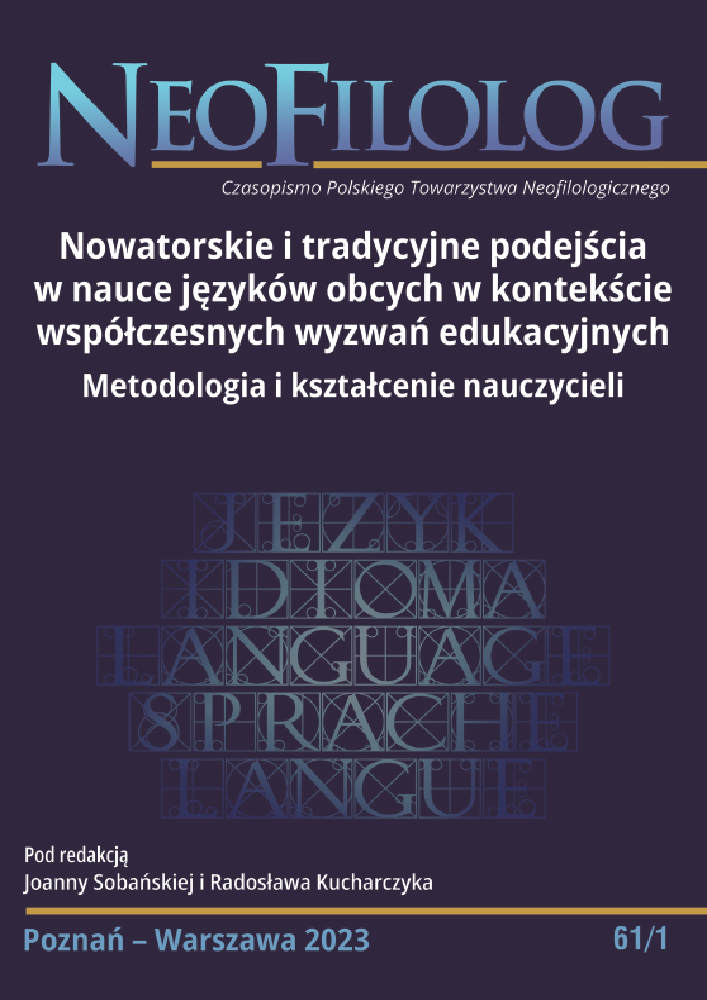Abstract
While studies on interpretative repertoires have been conducted in SLA, this is still a fairly new topic with regard to language teachers. Due to various contextual differences, teachers’ interpretative repertoires change, which also seems a sufficient reason why they should be investigated on a regular basis. The aim of this study is to identify and analyse Polish in-service teachers’ (n=48) interpretative repertoires concerning language which emerged in the teachers’ discourses in the context of their taking a promotion examination. Acknowledging the complexity of this issue, interpretative repertoires, including the SLA studies devoted to identifying them, are first discussed, followed by a description of the study. In terms of methodology, the author’s field notes for data collection were used. The data were coded following the content analysis approach, and 6 conceptualizations of language emerged: language as system, language as communication, language as culture, but also as translanguaging, as preparation for exam, and as life preparation. The findings can be used to adopt new directions in future research on Polish teachers’ language-based interpretative repertoires. The study may also provide information for school policies and practice.
References
Adamson M. (2014), Reflexivity and the construction of competing discourses of masculinity in a female-dominated profession. “Gender, Work and Organization”, Vol. 2, No 6, pp. 559–572. DOI: https://doi.org/10.1111/gwao.12058
Barkhuizen G. (2010), An extended positioning analysis of a pre-service teacher’s better life small story. “Applied Linguistics”, Vol. 31, No 2, pp. 282–300. DOI: https://doi.org/10.1093/applin/amp027
Edley N. (2003), Analysing masculinity: Interpretative repertoires, ideological dilemmas and subject positions, (in:) Wetherell M., Taylor, S., Yates S. (eds.), Discourse as data: A guide for analysis. London: Sage Publications Ltd, pp. 189–228.
Gilgun J.F. (2020), Writing up qualitative research, (in:) Leavy P. (ed.), The Oxford handbook of qualitative research. Oxford: Oxford University Press, pp. 985–1011. DOI: https://doi.org/10.1093/oxfordhb/9780190847388.013.36
Harrison A.K. (2020), Ethnography, (in:) Leavy P. (ed.), The Oxford handbook of qualitative research. Oxford: Oxford University Press, pp. 329–358. DOI: https://doi.org/10.1093/oxfordhb/9780190847388.013.20
Jolanki O., Jylha A., Hervonen A. (2000), Old age as a choice and as a necessity. Two interpretative repertoires. “Journal of Aging Studies”, Vol. 14, No 4, pp. 359–372. DOI: https://doi.org/10.1016/S0890-4065(00)80002-X
Kalaja P. (2016), Student teachers’ beliefs about L1 and L2 discursively constructed: A longitudinal study of interpretative repertoires, (in:) Kalaja P., Barcelos A.M.F., Aro M., Ruohotie-Lyhty M. (eds), Beliefs, agency and identity in foreign language learning and teaching. Basingstoke: Palgrave Macmillan, pp. 97–123. DOI: https://doi.org/10.1057/9781137425959_6
Lee M., Ong, Y.H., Martiminakis M.A. (2020), Understanding decision-making in interprofessional team meeting through interpretative repertoires and discursive devices. “Journal of Interprofessional Care”, Vol. 35, No 2, pp. 164–174. DOI: https://doi.org/10.1080/13561820.2020.1732889
Pirhonen H. (2021), Towards multilingual competence: examining beliefs and agency in first year university students’ language learner biographies. “The Language Learning Journal”, Vol. 50, No 5, pp. 613–626. DOI: https://doi.org/10.1080/09571736.2020.1858146
Potter J. (1996), Representing reality: Discourse, Rhetoric and Social Construction. London: Sage. DOI: https://doi.org/10.4135/9781446222119
Potter J. (1998), Discursive social psychology: From attitudes to evaluations. “European Review of Social Psychology”, Vol. 9, pp. 233–266. DOI: https://doi.org/10.1080/14792779843000090
Potter J., Wetherell M. (1987), Discourse and Social Psychology: Beyond Attitudes and Behaviour. London: Sage.
Richards, J.C., Lockhart C. (1999), Reflective teaching in second language classrooms. Cambridge: Cambridge University Press.
Ruohotie-Lyhty M. (2016), Dependent or independent: the construction of the beliefs of newly qualified foreign language teachers, (in:) Kalaja P., Barcelos A.M.F., Aro M., Ruohotie-Lyhty M. (eds), Beliefs, agency and identity in foreign language learning and teaching. Basingstoke: Palgrave Macmillan, pp. 149–171. DOI: https://doi.org/10.1057/9781137425959_8
Szumiec M. (2017), System awansu zawodowego nauczycieli. Ocena kluczowego elementu reformy edukacji. Kraków: Impuls.
Werbińska D. (2017), A teacher-in-context: Negotiating professional identity in a job promotion examination. “Apples – Journal of Applied Language Studies”, Vol. 11, No 2, pp. 103–123. DOI: https://doi.org/10.17011/apples/urn.201708233541
Werbińska D. (2022), In-service language teachers’ examination discourses: Interpretative repertoires and positioning. Słupsk: Wydawnictwo Naukowe Akademii Pomorskiej w Słupsku.
Zembylas M., Charalambous P., Charalambous C. (2011), Teachers’ emerging stances and repertoires towards reconciliation: potential and challenges in Greek-Cypriot education. “Journal of Peace Education”, Vol. 8, No 1, pp. 19–36. DOI: https://doi.org/10.1080/17400201.2011.553378
License
Copyright (c) 2023 Dorota

This work is licensed under a Creative Commons Attribution-NoDerivatives 4.0 International License.
Authors
Authors of texts accepted for publication in Neofilolog are required to complete, sign and return to the Editorial team’s office the Agreement for granting a royalty-free license to works with a commitment to grant a CC sub-license.
Under the agreement, the authors of the texts published in Neofilolog grant Adam Mickiewicz University in Poznań a non-exclusive, royalty-free license and authorize the use of Attribution-NoDerivatives 4.0 International (CC BY-ND 4.0) Creative Commons sub-license.
The authors retain the right to the free disposal of the work.
Users
Interested Internet users are entitled to use works that have been published in Neofilolog since 2017, under the following conditions:
▪ attribution – obligation to provide, together with the distributed work, information about the authorship, title, source (link to the original work, DOI) and the license itself.
▪ no derivatives – the work must be preserved in its original form. Without the author's consent, it is not possible to distribute the modified work in the form of translations, publications, etc.
Copyrights are reserved for all texts published since 2017.
Miscellaneous
Adam Mickiewicz University in Poznań retains the property right as a whole (layout, graphic form, title, cover design, logo etc.).

